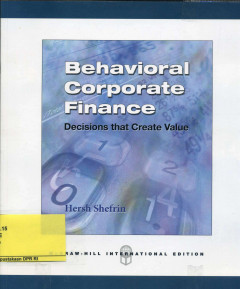Ditapis dengan
Ditemukan 1 dari pencarian Anda melalui kata kunci: author=Hers Shefrin

Behavioral corporate finance
Behavioral corporate finance identifies the key behavioral concepts associated with every major topic in corporate finance : capital budgeting, capital structure, valuation, dividend policy, corporate governance, and mergers and acquisitions. Behavioral traps represent one of the most important obstacles to the successful implementation of the skill taught in traditional corporate
- Edisi
- -
- ISBN/ISSN
- 007-125736-5
- Deskripsi Fisik
- Xviii, 203 hal. : il. ; 24 cm
- Judul Seri
- -
- No. Panggil
- -
 Karya Umum
Karya Umum  Filsafat
Filsafat  Agama
Agama  Ilmu-ilmu Sosial
Ilmu-ilmu Sosial  Bahasa
Bahasa  Ilmu-ilmu Murni
Ilmu-ilmu Murni  Ilmu-ilmu Terapan
Ilmu-ilmu Terapan  Kesenian, Hiburan, dan Olahraga
Kesenian, Hiburan, dan Olahraga  Kesusastraan
Kesusastraan  Geografi dan Sejarah
Geografi dan Sejarah